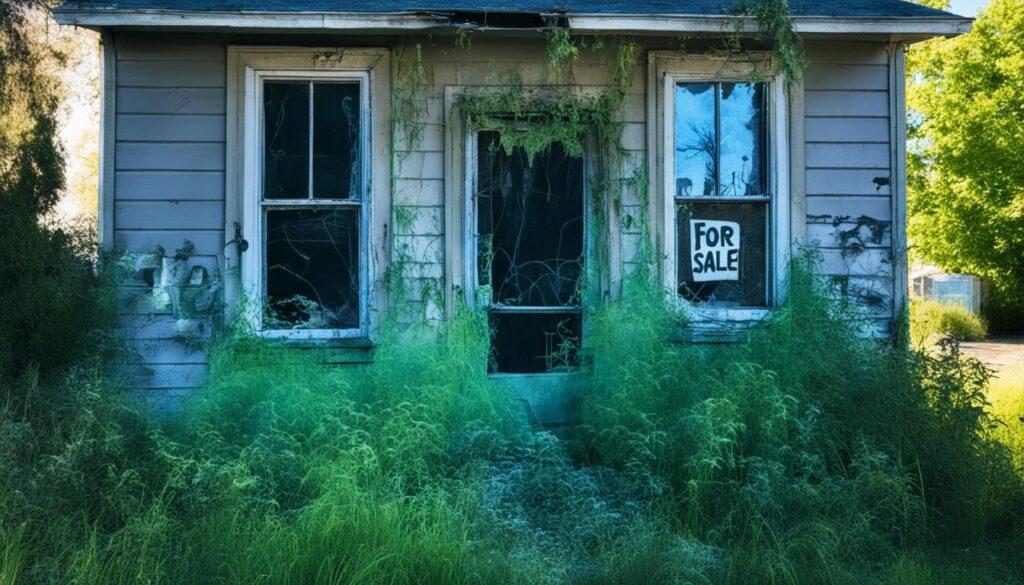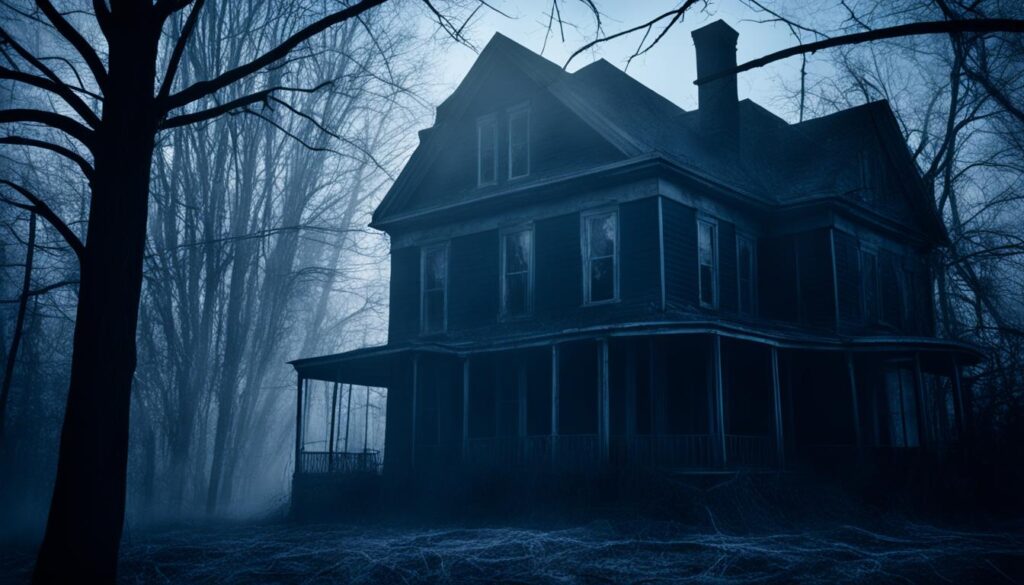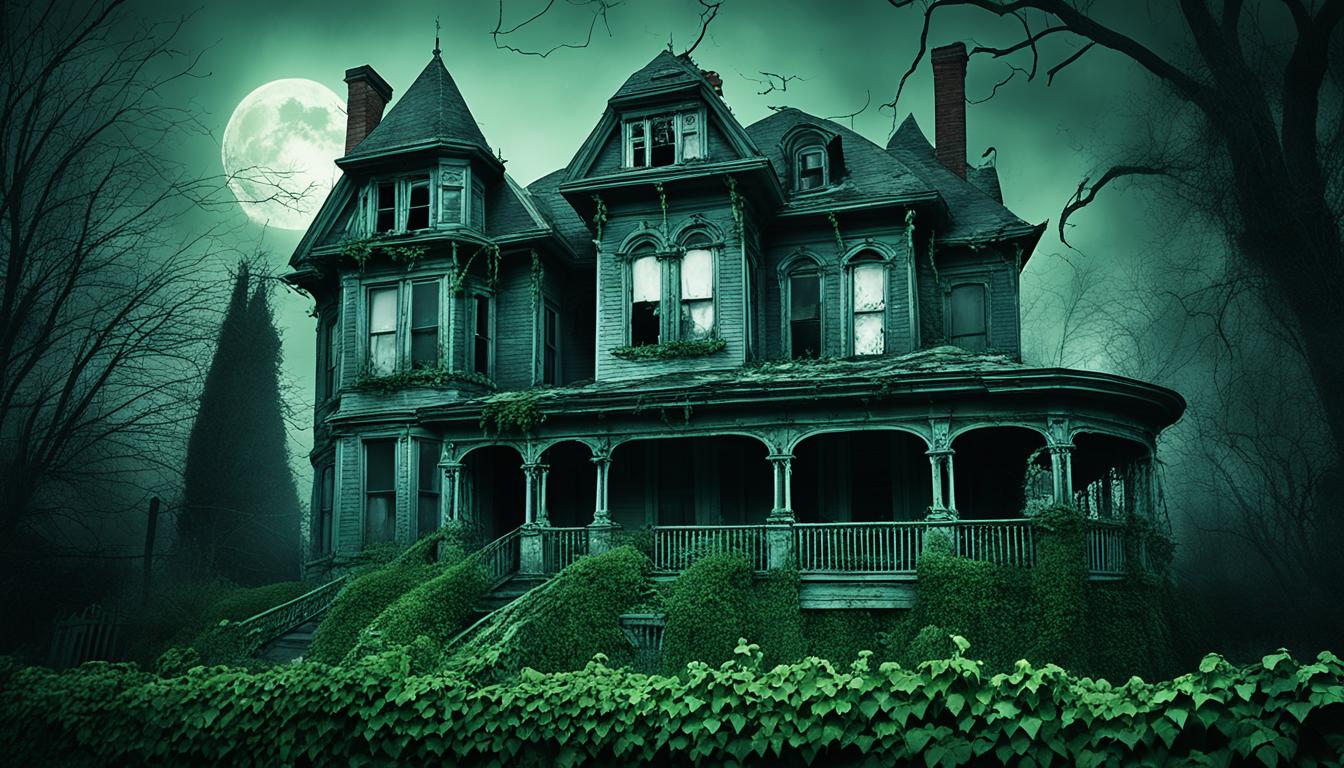Imagine your dream home could be haunted. In most states, sellers don’t have to tell you. As Halloween approaches, let’s dive into the spooky world where The Impact of Paranormal Activity on Real Estate meets haunted houses, ghost sightings, and paranormal phenomena. These can turn stigmatized properties into a real estate nightmare.
State laws differ on disclosure requirements for supernatural occurrences. Only four states – New York, New Jersey, Massachusetts, and Minnesota – mention paranormal activity in their laws. In New York, buyers can cancel a sale if the seller makes the house seem haunted. But in New Jersey, sellers must only tell buyers about ghostly roommates if asked.
Many states don’t make sellers reveal facts that could affect buyer perceptions and home valuations. This includes supernatural occurrences. It’s a situation that makes many wonder – do you have the right to know if your home might be haunted?
Key Takeaways
- Only four states – New York, New Jersey, Massachusetts, and Minnesota – directly address paranormal activity in their real estate disclosure laws.
- Many states have laws that don’t require disclosure of property “stigmas” or “psychological impacts,” which can include hauntings or supernatural occurrences.
- A notable 1991 New York case set a precedent allowing buyers to rescind a home sale due to a seller’s failure to disclose the house was haunted.
- Sellers and their agents must answer honestly when directly asked about paranormal activity, even if not legally required to disclose.
- Homes with rumored hauntings are considered “stigmatized properties” in the real estate market.
Introduction
The mix of paranormal activity and real estate is fascinating and not well understood. Haunted properties and supernatural events can change how the real estate market works. They affect both buyers and sellers. It’s key for real estate pros to grasp the legal sides of sharing this info.
Overview of the Paranormal Activity and Real Estate Connection
Paranormal activity can shape real estate in many ways. It can make people think a house is haunted or tainted by its past. This can change how buyers act, affect property values, and make selling harder. So, it’s vital for buyers and sellers to think about this.
Why It’s an Important Topic for Homebuyers and Sellers
For buyers, knowing the risks and laws of buying a haunted property is key. Sellers must deal with laws and the challenge of selling a haunted house. Understanding this complex issue helps everyone make smart real estate choices and ensures a fair process.
“The presence of paranormal activity can have a significant impact on the real estate market, affecting both homebuyers and sellers in ways that may not be immediately apparent.”
Legal Disclosure Requirements
Real estate markets can be affected by paranormal activity or a haunted reputation. Some states have laws about disclosing these issues. But, most don’t have clear rules.
States That Mandate Disclosure of Paranormal Activity
Only a few U.S. states require sellers to talk about paranormal activity in real estate. These are New York, New Jersey, Massachusetts, and Minnesota. Sellers must tell if a property is haunted or has paranormal stories. Not doing so could lead to the sale being canceled by a court.
States Without Disclosure Laws for Paranormal Activity
Most states don’t make sellers reveal paranormal activity or haunted reputations. They have laws that don’t require disclosure of “psychologically affected” or “stigmatized” properties. This includes deaths, murders, or supernatural events. Sellers don’t have to share these stories, but they might if asked by buyers or if they want to.
| State | Paranormal Activity Disclosure Requirement | Death Disclosure Requirement |
|---|---|---|
| New York | Sellers must disclose known paranormal activity | No specific law |
| New Jersey | Sellers must disclose if asked by the buyer | Sellers must disclose a death on the property if asked |
| Massachusetts | Sellers do not have to disclose paranormal activity | Sellers do not have to disclose deaths on the property |
| Minnesota | Sellers do not have to disclose paranormal activity | Sellers do not have to disclose deaths on the property |
| California | No specific law | Sellers must disclose deaths on the property within the last 3 years |
Homebuyers and sellers should know their state’s laws about paranormal activity, death, and other issues. Some states have strict rules, while most leave it up to the parties involved.
The Impact of Paranormal Activity on Real Estate
Effects on Property Values and Marketability
When a home is known to be haunted, it can really affect its value and how easy it is to sell. Buyers might not want to buy a home with ghost stories, which can lower its haunted home values. Selling a home with a “haunted” label can also be tough because buyers might worry about the risks or feel uneasy about the property.
In places like New Orleans, haunted homes are quite common. Some real estate signs even say “not haunted” to attract buyers. This shows how big of an impact paranormal activity impact can have on a home’s appeal and value.
Not all states make sellers tell buyers about haunted or stigmatized properties. The laws on this topic vary, making it tricky to handle buyer perceptions of ghosts during real estate deals.
| Statistic | Impact |
|---|---|
| A murder-suicide inside a house is considered a psychological stigma, not a material defect. | This can lead to challenges in disclosure requirements and buyer perceptions. |
| A court ruling in a case involving a haunted property declared the property as haunted “as a matter of law,” preventing the seller from denying the existence of ghosts. | This demonstrates the legal recognition of paranormal activity and its implications for real estate transactions. |
| Stigmatized properties, such as those with ghosts or paranormal activity, are considered undesirable by some buyers for emotional or psychological reasons. | This can result in reduced demand and lower haunted home values for such properties. |
The effect of ghosts on real estate is big, touching both property values and marketability. Both buyers and sellers need to understand this unique part of real estate.
Real Estate Agent Experiences
Real estate agents often face unique challenges when marketing and selling properties with paranormal activity. Jennifer Stauter Kornstedt, a Zillow Premier Agent in Wisconsin, shared her story. She worked with a seller whose home was said to be haunted by a ghost in the basement. During an open house, she heard strange banging noises and got calls with only static.
Even though they didn’t have to tell buyers about the ghost, Stauter Kornstedt and the seller chose to be honest. “We wanted to be transparent and not hide anything,” she said. “It was important to us to be honest about the home’s history.”
Embracing the Paranormal Reputation
Some agents find that a property’s ghost stories can actually help sell it. MerryFox Realty in Massachusetts says about 1 in 10 people ask about “psychologically impacted” properties. This includes those with suspected “parapsychological or supernatural phenomenon.”
Most of these interested buyers want properties with a history of deaths, says Tammy Fox of MerryFox Realty. “We have a lot of interest in properties with a paranormal history,” she said. “It attracts a different group of buyers who are excited about the unique features.”
| Location | Paranormal Reputation |
|---|---|
| Salem, Massachusetts | The Joshua Ward House on Washington Street is known for numerous reports of ghost sightings. |
| Danvers, Massachusetts | The Daniels House is said to have eerie occurrences like faucets turning on by themselves. |
| Marblehead, Massachusetts | Several properties in the downtown area are believed to have supernatural presences. |
MerryFox Realty doesn’t call these properties “haunted” because people’s experiences can vary. They only share information about supernatural phenomena if a buyer asks.
“We wanted to be transparent and not hide anything. It was important to us to be honest about the home’s history.”
Buyer Perceptions and Stigma
Buying a home can be scary if it’s said to be haunted. Many buyers don’t want to live in a place with ghosts. This fear can make haunted homes hard to sell and lower their value.
Most people don’t want to buy a house with ghost stories. Even if the price is low, they’re still scared. They worry about strange happenings and how it might affect their home’s value.
Haunted homes are tough to sell. Buyers are put off by the idea of ghosts. This fear makes it hard for sellers to find buyers.
- Many buyers don’t want to look at homes known for ghosts.
- Even with a low price, buyers are still scared off.
- Selling a haunted home is a big challenge.
This fear affects the real estate market a lot. Sellers of haunted homes struggle to find buyers. Buyers’ fears can lower the home’s value and make it hard to sell.
“Haunted properties in Ontario are documented on torontoghosts.org by the Toronto and Ontario Ghosts and Hauntings Research Society.”
It’s important to understand how buyers feel about haunted homes. This fear affects both buyers and sellers in the real estate market.
Marketing Strategies for Haunted Homes
If your home is known for being haunted, you might think it’s a bad thing. But, there are ways to use this to your advantage. Many buyers are okay with a haunted history if the seller is honest about it.
Embracing the Paranormal Reputation
Advertise your home as “haunted” to draw in paranormal fans and thrill-seekers. This makes your home stand out and attracts buyers looking for something unique.
Ghost Tours and Paranormal Investigations
Some homeowners with haunted homes make money by offering ghost tours and paranormal investigations. This lets them earn extra cash and get more people interested in their property. But, they need to be careful not to scare off potential buyers.
Using a haunted home’s spooky side can be a smart way to sell it. By understanding how paranormal activity affects real estate, you can find new ways to market your home. This could help you sell your haunted home faster.

The Impact of Paranormal Activity on Real Estate
Paranormal activity can really affect the real estate market. Homes known for supernatural events often sell for less. This is because buyers worry about the psychological effects and risks of living in such a place. This leads to lower haunted home values and makes these properties harder to sell.
A recent survey found that 44% of people think strange noises are a sign of paranormal activity. Also, 13% of Americans think their homes are haunted. And 54% knew or suspected their house was haunted before moving in. Yet, 56% of those living in haunted houses haven’t thought about moving. This shows some buyers might ignore paranormal issues for a good property.
How people view haunted homes varies by region and who they are. For example, Northeasterners are more okay with living in haunted houses, with 76% suspecting their house was haunted before moving. But 62% wouldn’t think about living in a rumored haunted house. The Northeast was the most hesitant at 66%, while the West was the least at 52%.
The effects of paranormal activity on real estate are big. Homes with ghost stories often need big discounts to sell. 40% of buyers want a discount when buying a haunted house. Sometimes, these homes can lose 10% to 25% of their value if there’s a death linked to the haunting.
| Characteristic | Percentage |
|---|---|
| Respondents aged 55 and over unlikely to consider living in a haunted house | 64% |
| Men unlikely to consider living in a haunted house | 54% |
| Women unlikely to consider living in a haunted house | 70% |
| Respondents aged 18-34 needing a discount greater than 10% to purchase a haunted house | 39% |
| Respondents aged 55 and older saying no discount would be sufficient to purchase a haunted house | 37% |
Paranormal activity’s effect on real estate is complex and varies a lot. Buyer views and market implications differ widely. As real estate changes, understanding how supernatural beliefs affect property values and sales is key for buyers, sellers, and real estate pros.
Paranormal Property Disclosure Laws by State
When it comes to telling buyers about paranormal activity or a haunted history, laws vary a lot across the US. Some states have laws for this, but most don’t. They either don’t make sellers tell about “psychologically affected” or “stigmatized” properties, or they don’t have laws that make sellers talk about supernatural stuff.
State-by-State Analysis of Disclosure Requirements
Only four states in the US have laws about telling buyers about haunted properties: New York, New Jersey, Massachusetts, and Minnesota. These states have their own ways of dealing with haunted houses:
- New York’s “Ghostbusters” ruling lets sellers say a house is haunted if they’ve told the public about it. Otherwise, they don’t have to say anything.
- New Jersey makes sellers tell about paranormal stuff only if the buyer asks.
- Massachusetts and Minnesota say sellers don’t have to tell about paranormal or supernatural stuff because it’s “psychologically affected”.
On the other hand, nine states have laws about telling buyers if someone died on the property. For example, California says to tell within three years of the death. Alaska wants it done within one year.
In places like Tennessee, there’s no need to tell about things that didn’t damage the property, like murders, suicides, or deaths. They don’t talk about paranormal stuff either.
So, buyers and sellers need to check their state’s laws to know what they must do with haunted properties.

Debunking Paranormal Claims
The idea of paranormal activity is intriguing, but it’s key to look for rational explanations for alleged hauntings. Many things thought to be supernatural can be explained by natural events, like a house settling or strange noises. Experts in paranormal research and home inspections often find non-supernatural causes for what seems spooky.
Exploring Rational Explanations for Alleged Hauntings
Recent stats show 45% of Americans believe in ghosts, and 36% have had ghostly experiences. Shows like “Ghost Adventures” have made these stories more popular. But, many paranormal claims can be explained by natural occurrences.
- Unusual sounds, like creaking floors or rattling doors, are often from a house settling or changes in temperature and humidity.
- Flickering lights or electrical issues might be from bad wiring or old electrical systems, not ghosts.
- Feeling scared or like you’re being watched can come from suggestion, especially in places known as haunted.
Experts in haunted house investigations can find the rational explanations behind these strange happenings. This helps clear up myths and helps buyers make better choices.
More people are into ghost hunting, but it’s wise to be skeptical. Cases like teens getting hurt in a haunted place and a death from a fall at a University of Toronto building warn us.
Knowing the natural and psychological reasons behind ghost stories helps buyers and sellers make smarter choices. They won’t be swayed by false paranormal claims.
Ethical Considerations
When dealing with paranormal activity or a home’s haunted past, ethical thoughts are key. Sellers must tell the truth but also keep their privacy. They might not want to share personal or scary events that could make the home seem bad.
Real estate agents and lawmakers need to find a middle ground. They should make sure buyers get the facts but also protect sellers’ privacy. According to a recent survey, 67% of Americans agree that sellers should disclose hauntings and other stigmas related to properties. This topic is tricky and has many sides.
| Disclosure Requirements | Privacy Rights |
|---|---|
| Sellers must tell buyers about any known problems, like hidden issues or haunted pasts. This includes stories of paranormal activity. | But sellers also expect privacy. They might not want to share personal or scary events that happened at the property. Sharing these could make people think the property is cursed, hurting its sale. |
| Buyers need to know all they can to make good choices. Telling them about the property’s issues helps them understand its true value and if it’s right for them. | Sellers might say they don’t have to share things that aren’t physical problems or personal stories. They argue these don’t threaten the property’s safety. |
Finding the right balance is hard. Real estate pros and lawmakers must think about each situation’s details. They aim to protect buyers and sellers’ rights. The main goal is a fair real estate market that respects the ethical sides of paranormal property sales and their psychological stigma.
Conclusion
The topic of how paranormal activity affects real estate is both complex and intriguing. Only a few states make it mandatory to tell about ghostly happenings. Yet, a haunted reputation can greatly lower a property’s value and how easy it is to. Buyers need to be careful and look for logical reasons behind ghost stories. Sellers should think about the right thing to do when sharing information.
Many people are now interested in buying haunted houses, with almost 70% open to the idea if the house is perfect in other ways. But, the rules on telling about ghosts vary by state. Some say you must tell, others let the seller decide. This makes things tricky for buyers and sellers alike.
As real estate and the paranormal worlds meet, we must keep an open mind. Knowing what buyers and sellers think can help you make better choices. The effect of ghosts on real estate is complex and needs careful thought from all sides.
FAQ
What are the legal requirements for disclosing paranormal activity or a haunted reputation when selling a property?
Laws about sharing info on paranormal activity or a haunted reputation vary by state. Only a few states like New York, New Jersey, Massachusetts, and Minnesota have laws about it. Most states don’t make you share info about supernatural happenings.
How can the presence of paranormal activity or a haunted reputation impact the value and marketability of a real estate property?
Paranormal activity or a haunted reputation can lower a property’s value and make it harder to sell. Buyers might not want a home known for ghosts, which can make the property less valuable. Selling such a home can be tough because buyers might not want the risk or the feeling of unease it brings.
What are some real estate agent experiences dealing with the challenges of marketing and selling properties with perceived paranormal activity?
Real estate agents face many challenges with properties thought to be haunted. Jennifer Stauter Kornstedt, a Zillow Premier Agent in Wisconsin, worked with a seller whose home was said to have a ghost in the basement. During an open house, strange banging noises were heard, and many calls had only static. They chose to tell potential buyers about the ghost to be honest.
How can sellers successfully market a property with a known paranormal or haunted reputation?
Some sellers do well by embracing their property’s haunted side. They market it as “haunted” to draw in those who love the supernatural. This can include ghost tours, paranormal investigations, or highlighting the spooky history to grab attention.
Are there any ethical considerations when it comes to the disclosure of paranormal activity or a home’s haunted reputation?
Yes, there are ethical thoughts to consider. Sellers should be honest but also protect their privacy. Real estate agents and lawmakers must find a balance. They should give buyers the facts while respecting the sellers’ privacy rights.
Source Links
- Selling a Haunted House? Here’s What You Need to Know – https://zillow.mediaroom.com/2019-10-29-Selling-a-Haunted-House-Heres-What-You-Need-to-Know
- Do You Have to Tell Buyers Your House Is Haunted? – https://home.howstuffworks.com/real-estate/selling-home/haunted-house-for-sale.htm
- Buyer beware: What they don’t tell you about buying a haunted house – https://www.legalzoom.com/articles/buyer-beware-what-they-dont-tell-you-about-buying-a-haunted-house
- When your house has a (disturbing) history, what should buyers be told about its ‘past’? – https://theconversation.com/when-your-house-has-a-disturbing-history-what-should-buyers-be-told-about-its-past-132766
- PDF – https://apcz.umk.pl/EiP/article/download/43267/38222/136081
- 4.1 Demon Debt: PARANORMAL ACTIVITY as Recessionary Post-Cinematic Allegory – https://reframe.sussex.ac.uk/post-cinema/4-1-julia-leyda/
- Selling a Haunted House? Here’s What You Need to Know – https://www.zillowgroup.com/news/selling-a-haunted-house/
- Can real estate disclosure laws protect buyers from the supernatural? – https://www.abajournal.com/web/article/can-real-estate-disclosure-laws-protect-buyers-from-the-supernatural
- Ghostly Real Estate – https://www.yardi.com/blog/news/ghostly-real-estate/36930.html
- Stigmatized Properties: Understanding the Impact on Real Estate Sales – https://www.linkedin.com/pulse/stigmatized-properties-understanding-impact-real-gassett-realtor-zu6qe
- What is it like to sell a haunted house? These realtors know. – https://www.boston.com/real-estate/real-estate-news/2020/10/29/what-is-it-like-to-sell-haunted-house/
- Selling a Haunted House? Here’s What You Need to Know – https://www.prnewswire.com/news-releases/selling-a-haunted-house-heres-what-you-need-to-know-300946865.html
- Should I Tell Buyers My House is Haunted? – https://www.windermere.com/blog/should-i-tell-buyers-my-house-is-haunted
- When it comes to property’s paranormal history, it’s buyer beware – https://carlsonassociates.ca/when-it-comes-to-propertys-paranormal-history-its-buyer-beware/
- How to Sell a Haunted House – https://www.linkedin.com/pulse/how-sell-haunted-house-virtuance
- Help! How can I sell my haunted house? | Edina Realty – https://www.edinarealty.com/real-estate-advice/what-to-do-when-you-own-a-haunted-house
- Tips for Marketing a Property with a Dark Past | Socotra Capital – Hard Money Loans and Real Estate Lending – https://blog.socotracapital.com/tips-marketing-property-dark-past
- Many People Are Open To Living With Things That Go Bump In The Night – https://www.forbes.com/sites/brendarichardson/2020/10/14/many-people-are-open-to-living-with-things-that-go-bump-in-the-night/
- Do you have to reveal your house is haunted before selling? – https://www.fox5atlanta.com/news/do-you-have-to-reveal-your-house-is-haunted-before-selling
- Does Buying a Haunted House Save Money? – Experian – https://www.experian.com/blogs/ask-experian/does-buying-haunted-house-save-money/
- Are Sellers Required To Disclose That Their House Is Haunted? – KRBS Law – https://krbslaw.com/are-sellers-required-to-disclose-that-their-house-is-haunted/
- Selling a Haunted House? What You Need to Know – https://www.floridarealtors.org/news-media/news-articles/2023/10/selling-haunted-house-what-you-need-know
- Paranormal Investigators: Exploring a Positive Social Construct Through Paranormal Belief and Investigations – https://digitalcommons.usu.edu/cgi/viewcontent.cgi?article=2682&context=gradreports
- Ghost hunting – https://en.wikipedia.org/wiki/Ghost_hunting
- Stigmatized Properties – https://www.nar.realtor/stigmatized-properties
- Murder, Ghosts and Other Chilling Things You May Not Know Before Purchasing Property – https://www.sorbaralaw.com/resources/knowledge-centre/publication/murder-ghosts-and-other-chilling-things-you-may-not-know-before-purchasing-property
- Teaching stigmatized property, page 1 Teaching stigmatized property: You don’t have a ghost of a chance — J. David Chapman – https://www.jdavidchapman.com/blog-2-1/teaching-stigmatized-property-page-1-teaching-stigmatized-property-you-dont-have-a-ghost-of-a-chance
- Things That Go Bump in the Literature: An Environmental Appraisal of “Haunted Houses” – https://www.ncbi.nlm.nih.gov/pmc/articles/PMC7304295/
- Massachusetts Stigmatized Properties: What You Need to Know – https://massrealestatenews.com/stigmatized-property/
- A Psychological Thriller – The Case for Liability for Undisclosed Psychological Defects in Residential Sales – Timoney Knox LLP – https://www.timoneyknox.com/a-psychological-thriller/

